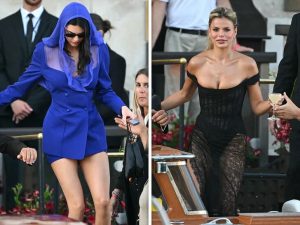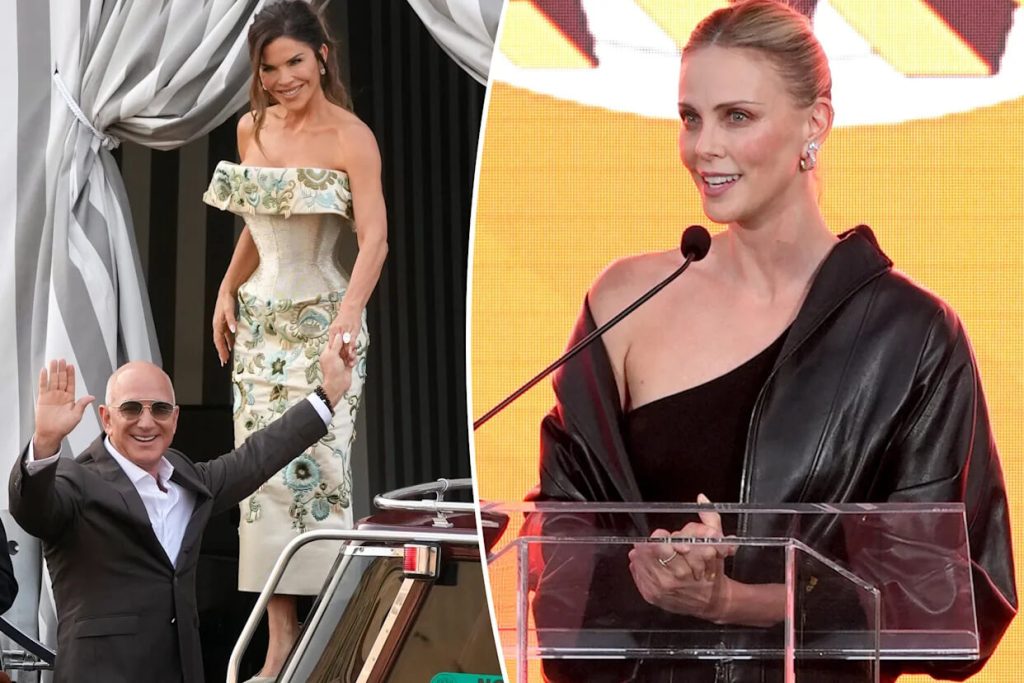world news
Charlize Theron’s Viral Swipe at Bezos–Sánchez Wedding: Why Her Bold Remark Captured a Global Moment
The Joke Heard Around the World
At what should have been a routine philanthropic celebration, Charlize Theron casually dropped a line that lit up headlines, hashtags, and heated debates. During her 5th annual Block Party for the Charlize Theron Africa Outreach Project (CTAOP) at Universal Studios on June 29, 2025, the acclaimed actress and activist took the microphone and made a quip that sliced through the glitz of Hollywood like a scalpel:
“I think we might be the only people who did not get an invite to the Bezos wedding. But that’s OK because they suck and we’re cool.”
Delivered with effortless confidence, the remark instantly became one of the most widely shared celebrity soundbites of the year. But it wasn’t just the cheeky delivery or the name-drop of billionaire Amazon founder Jeff Bezos and media personality Lauren Sánchez that caught fire—it was the timing, the subtext, and the larger questions it raised about celebrity, excess, and purpose in a time of global crisis.
Theron, no stranger to balancing humor with activism, used the moment as a springboard to amplify the urgent social justice causes that define her career. Her line about not attending the Bezos–Sánchez wedding wasn’t just a comedic jab; it was a cultural statement, and the audience knew it. Amidst the laughter, there was an unmistakable undercurrent of reckoning: what does it mean when billionaires throw $50 million weddings while advocacy groups are fighting to secure basic rights and protections for millions around the world?

Bezos and Sánchez’s Venice Affair: Opulence or Obscenity?
Just days before Theron’s event, Jeff Bezos and Lauren Sánchez held one of the most extravagant celebrity weddings in modern memory. With Venice, Italy, as the backdrop and a $50 million price tag, the Bezos–Sánchez wedding was the epitome of opulence. The couple hosted days of themed parties—from foam-filled yacht nights to luxurious pajama brunches. The ceremony itself took place on San Giorgio Maggiore island, with vocal performances from Ellie Goulding and Matteo Bocelli, evoking the grandeur of royal nuptials.
The guest list read like a Hollywood Hall of Fame: Leonardo DiCaprio, Oprah Winfrey, Tom Brady, Kim Kardashian, Orlando Bloom, Katy Perry, and numerous other moguls, artists, and influencers. Venetian locals, however, were less than thrilled. Protesters gathered, holding signs condemning billionaire tax avoidance and the privatization of public spaces. Banners that read “If you can rent Venice for your wedding, you can pay more taxes” signaled a powerful backlash against excess.
The juxtaposition couldn’t have been more stark. As wedding photos flooded Instagram and headlines gushed over designer gowns and celebrity selfies, Italian citizens and global spectators questioned whether such extravagance was morally defensible. The romantic narrative of two high-profile lovers tying the knot had morphed into a full-blown socio-economic debate.
Reports later confirmed that Bezos and Sánchez donated to several local charities and invested €2 million into environmental initiatives for the Venetian lagoon. Yet even this gesture was viewed by some as insufficient—a symbolic offering in exchange for commandeering a historic city. Critics accused the couple of greenwashing the event. The spotlight intensified, and it was into this heated atmosphere that Charlize Theron stepped, wielding wit and conviction in equal measure.
Theron’s Philanthropic Pivot: From Punchline to Purpose
Charlize Theron has long been a vocal advocate for gender equity, HIV prevention, and youth empowerment through her Africa Outreach Project. But at the CTAOP Block Party, she reminded the audience that her activism extends far beyond traditional charity models. Following her viral Bezos remark, she seamlessly transitioned into an impassioned speech:
“Here in Los Angeles, in the U.S., and across the globe, we are moving backward—fast. Women’s rights, the lives of queer and trans people, access to healthcare, the rise of gender-based violence… this isn’t just politics, it’s personal.”
With those words, Theron crystallized the night’s core message: social progress is not guaranteed, and neither wealth nor celebrity should be a substitute for responsibility. She used her platform to draw attention to the global rollback of women’s and LGBTQ+ rights, the silencing of reproductive freedoms, and the violence inflicted daily on vulnerable communities.
This speech was not scripted for applause. It was charged, raw, and delivered by someone who knows the stakes. Theron’s career has spanned from Oscar-winning performances to the gritty realities of global health advocacy. Her words served as a reminder that celebrity culture doesn’t have to be apolitical or passive. It can be strategic, disruptive, and deeply human.
That contrast—between Theron’s charity-driven event and the Bezos–Sánchez luxury spectacle—wasn’t lost on anyone. While guests at Bezos’s wedding were serenaded on yachts, guests at Theron’s Block Party were asked to engage, donate, and advocate. The underlying message? You don’t need a billion-dollar wedding to make history. Sometimes, all it takes is courage, conviction, and a microphone.

The Internet Reacts: Divided Applause and Celebrity Accountability
As expected, the internet lit up after Theron’s remarks. Social media was flooded with posts applauding her “brutal takedown” of the billionaire wedding industrial complex. Memes, reaction videos, and hashtags like #TheySuckWereCool and #TheronSpeaks trended for days. Fans lauded her for speaking truth to power, with one viral tweet declaring, “Charlize Theron just punked every millionaire on that guest list. Queen energy.”
However, not all reactions were celebratory. Critics accused her of bitterness or hypocrisy, arguing that she herself is a wealthy celebrity who attends elite events. “She’s not exactly poor,” one user wrote, while another commented, “Jealousy looks bad on everyone—even Oscar winners.”
Others questioned the sincerity of her jab, suggesting it was a calculated move for media coverage. Was this a genuine protest or a media-savvy maneuver? Was Theron genuinely offended by the wedding’s exclusivity, or was she using it as a timely hook to elevate her own platform?
These debates expose a deeper fault line in contemporary celebrity culture: the tension between participation in the elite and critique of the elite. Can you be both part of Hollywood and a critic of its values? Theron seemed to answer yes, proving that you can leverage your visibility not just for glitz, but for good.
A Cultural Flashpoint: Between Excess and Ethics
In retrospect, Charlize Theron’s seven-word sentence—“they suck and we’re cool”—did more than take a dig at Jeff Bezos and Lauren Sánchez. It became a symbol of growing cultural discomfort with the extravagance of the ultra-wealthy, especially when juxtaposed with humanitarian crises and social backsliding.
The event exposed the widening disconnect between celebrity fantasy and real-world urgency. It challenged the idea that lavish weddings, private islands, and designer showcases are harmless entertainment. It forced a confrontation: what do we value more—the spectacle or the substance?
The global media cycle, which had initially fawned over the Venice wedding, suddenly shifted tone. Think pieces, op-eds, and critical essays poured in. Writers examined everything from environmental ethics to the role of billionaires in city life to the power imbalance in modern celebrity unions.
Theron’s joke, in this sense, became a cultural catalyst. It emboldened other public figures to speak out and reframed how we talk about wealth, visibility, and power. Her CTAOP Block Party wasn’t just a fundraising event—it became an act of resistance. One powered not by wealth or influence, but by guts, timing, and moral clarity.
In a world flooded with curated images and PR-perfect appearances, Charlize Theron offered something rare: a moment of unfiltered honesty, a laugh laced with truth, and a reminder that “cool” isn’t about wealth. It’s about integrity.
From purplerushclothing


